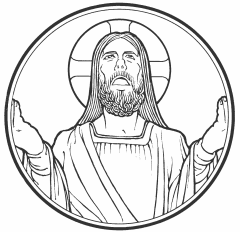Grace, mercy, and peace to you from God our Father, and from our Lord and Savior, Jesus Christ, amen. The text for the sermon is the Acts reading, which was read earlier.
There is bad news and good news for you today from the mouth of Peter. The bad news: “Let all the house of Israel therefore know for certain that God has made him both Lord and Christ, this Jesus whom you crucified.” But there is also good news for you as well: “Let all the house of Israel therefore know for certain that God has made him both Lord and Christ, this Jesus whom you crucified.” Within the same statement, there is both bad news and good news. Often times, a statement has either bad news or good news, not both. However, for Peter, as he begins his wonderful sermon, this statement is filled with both bad and good news.
As far as the bad news goes, it’s rather more of a statement: “this Jesus whom you crucified.”That is not something that you want to here, that you are the one who sent Jesus to be crucified. Peter announces this to “all the house of Israel.” In other words, he is addressing everyone.
Imagine what that must have felt like when the people heard that statement. Even the disciples were standing there as well and that statement was addressed to them also. With the exception of Judas, the disciples could never think of doing anything to harm Christ. And now Peter is telling them that it was they who crucified Christ. It was all those who were there who crucified Christ. It was all of Israel who crucified Christ. A large portion of the crowd might have been present at Christ’s crucifixion but none of them hammered the nails into Christ themselves. What Peter meant by his statement was that it was their sins that sent Christ to the cross. It was the sins of the disciples. It was the sins of the crowd. It was the sins of all of Israel. It was your sins.
The statement that Peter makes is one that cuts deep because it’s not a message that anyone wants to hear because it makes us come to reality with ourselves. It makes us acknowledge that we are sinners. It makes us acknowledge that because of our sins Christ had to go to the cross in the first place.
Those who were gathered there felt a huge amount of pain at the words of Peter. “Now when they heard this they were cut to the heart, and said to Peter and the rest of the apostles, “Brothers, what shall we do?”” They were willing to do whatever it took to right the situation. They wanted to feel better, if not for Christ’s sake, for their own. The shame they felt was enough to kill them. The disciples, especially, had the utmost respect for their Teacher. There was so much that He taught them, so much more they could have learned. But when they saw their Master crucified, they ran. They hid. They were ashamed and afraid. Now they are together. Feelings of shame and fear overtake them and the crowd. They were greatly troubled that they had sinned against God and killed the Christ.
The feelings that they felt 2000 years ago we feel today as well. It is hard not to. What if I told you that you alone were the cause of death of the Savior? What would you feel? If only your sins were present, Christ would have died for your sins. Why? Death entered through the craftiness of Satan and ruined what God had created, what had been deemed “ good” and “very good.” There was only one way to purge that death: through the death of an innocent. That’s where the good news comes in to play.
Peter says that God has made Jesus both Lord and Christ. It means that because He is both Lord and Christ, His death and resurrection have proven to be sufficient payment to God. Solely by what He has done for us on the cross, all those sins from Adam unto the present have been paid for. They have been atoned by the blood of Jesus that was shed upon the cross.
So what is left to the Christian, both then and now to do? We’ve already run in shame. We’ve already mourned and now are taking responsibility for our actions, that we have crucified Christ. There is only one thing left for us: “Repent and be baptized every one of you in the name of Jesus Christ for the forgiveness of your sins, and you will receive the gift of the Holy Spirit.”
Peter here uses the word “repent” simply to mean “believe.” This involves a changing of the mind effected by the Holy Spirit working through the Gospel in which an unbeliever becomes a believer. Peter invites the crowd to trust the forgiveness Jesus had already accomplished.
This repentance is not a condition for receiving forgiveness as the text implies: “for the forgiveness of your sins.” Such a thought would make forgiveness dependent upon human action. We are “dead in [our] transgressions and sins.”This repentance is all God’s doing by grace. Peter ties the forgiveness of sins to faith, baptism, and the Holy Spirit. When God empowers believers to share the Gospel, the Holy Spirit works through it to create faith in the hearts of unbelievers and to nourish the faith of those who already believe.
It is because we are dead that Jesus has come. It is because we need to have our sins forgiven that Jesus has come. It is because of God’s great love for His creation that Jesus has come. It is because of this wonderful gift that we are able to stand before God our heavenly Father and receive His graciousness, His invitation to be His beloved children. That comes from our repentance and baptism in Jesus’ name.
The best part of Peter’s sermon is what he leaves out: your action. Aside from repentance, which is the part of man, there is nothing else for you to do. All the action is solely the work of God for us. That is the way it is meant to be. That’s the way that Jesus spoke His entire ministry – He is the subject of the verbs, He is the one who is doing the action. We graciously receive all that He has to offer, namely the forgiveness, life, and salvation that comes about because of what Jesus Christ has done.
We have heeded the words of Peter through our baptism. “For it is by grace you have been saved, through faith….” Through our baptism, we have been marked as children of God. Through the Lord’s Supper, we continue to sustain our faith by the food that Christ gave to the disciples and to His Church.
Take heart, for “this Jesus whom you crucified”, has taken your sin from you. You have died in Christ and have been forgiven all of your sins through His death and resurrection. In Jesus’ name, amen. Now the peace of God which passes all understanding, keep your hearts and minds through faith in Christ Jesus, amen.


